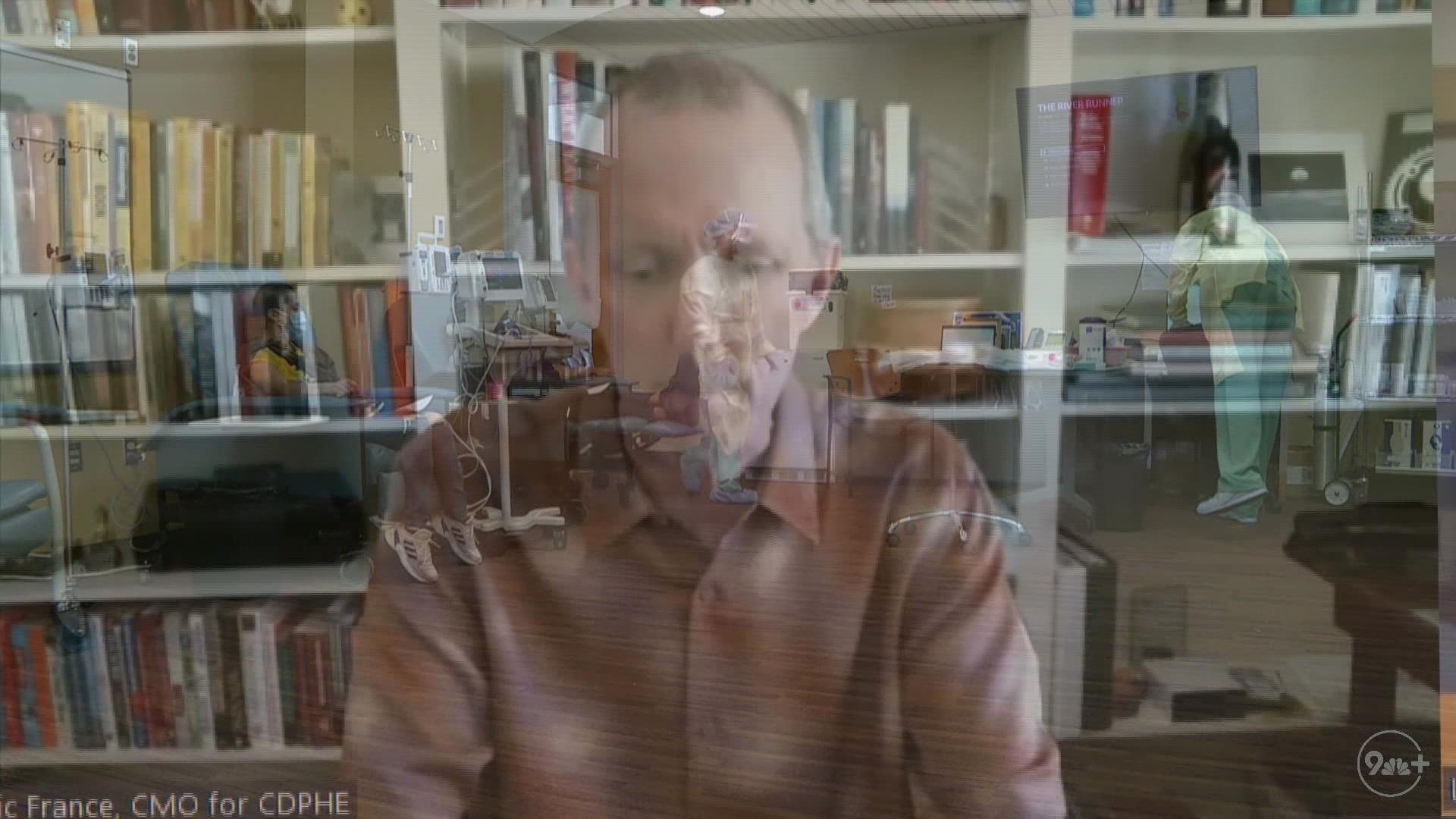COLORADO, USA — When the COVID-19 pandemic began, many people headed to the emergency room for treatment if they tested positive for COVID. Now, Coloradans who test positive might not only see a doctor and get treatment more easily, but also faster.
Colorado Department of Public Health and Environment (CDPHE) Medical Director Dr. Eric France spoke with 9NEWS about the COVID-19 treatment options available to Coloradans.
According to Dr. France, there are still cases of COVID-19 spreading in Colorado, and going into the fall and winter seasons, it is important that Coloradans know that effective treatment is available and how to get it. He said it will help prevent severe outcomes and protect hospital capacity.
France recommends that people talk to their doctor or their doctor's office first, but if people don't have a doctor, he said more treatment options can be found by visiting COVID19.colorado.gov.
Telehealth
Telehealth can help speed up the process of accessing treatment, especially for Coloradans in rural areas or others who can’t access an in-person appointment fast enough.
“Some of the options include a telehealth visit. There are companies that do video visits and they will assess you and determine your eligibility for treatments and then provide you a prescription so that you could get treated,“ he said.
"If people have health insurance, many insurance companies provide telehealth as one of your benefits, so you might just check with your health insurance provider to see if they have a telehealth provider already available that would be covered by your insurance," he said.
If people don’t have insurance, they can take a look at the list of providers that telehealth has, and for a small fee.
“I think it ranges between $30 to $60 you can do a visit with a doctor or a nurse practitioner," France said.
Test to Treat
France said there are also "Test to Treat" sites.
“These are places in Colorado where you can go and bring your positive test, or get a test, and if you are positive, they can give you a prescription right there if you qualify for the treatments,” he said.
Who qualifies for treatment?
France said many people qualify for treatment.
"It’s not some small group of high-risk folks," he said. "If you are overweight, if you are 60 years of age and older, if you have asthma, diabetes or other chronic conditions, you would qualify.”
“In Colorado, almost two of every three people are overweight, so that’s a lot of people who would qualify for treatment,” France said. "If they take these medicines, they can substantially lower their risk for being hospitalized or having severe disease."
People can also call to make an appointment at 1-800-232-0233.
How soon should you seek treatment?
France said people have to start the treatment within the first few days of getting sick – usually within five days.
"With some of the treatments, you can reduce your chances of getting seriously ill or being hospitalized by almost 90%. That's why it's important that if you test positive, you think about treatments right away," he said.
Does telehealth have Spanish-speaking physicians available?
France said many of the providers speak Spanish. He also reminded Coloradans that there are no ID or fees required to get vaccinated.
People can call 1-800-232-0233 to reach someone who speaks Spanish.
Recommendations for Coloradans to protect themselves against COVID-19?
France said people should get their vaccines to protect them from being severely ill and prevent hospitalizations. He said Coloradans can expect booster shots in just a few weeks.
“We expect that anybody 18 and over, that’s had their first COVID shots, will be eligible for the booster," he said. "So, in September, we’ll have many community sites and other clinic partners that will provide boosters. So, get your new booster. This is the booster that also covers for the omicron variant. It’s a new vaccine compared to the one we received over the past months or years.”
If you’re exposed, France said you should pay attention and if symptoms are present, you should get tested. If you are around someone who is high risk, you should wear a mask in case you caught it.
“Remember too that along with the COVID booster, don’t forget your flu booster this fall," France said. "We don’t want to fill up our hospitals with flu illness as well. So do your part, get vaccinated and get treated if you develop COVID symptoms."
SUGGESTED VIDEOS: COVID-19 Coronavirus

